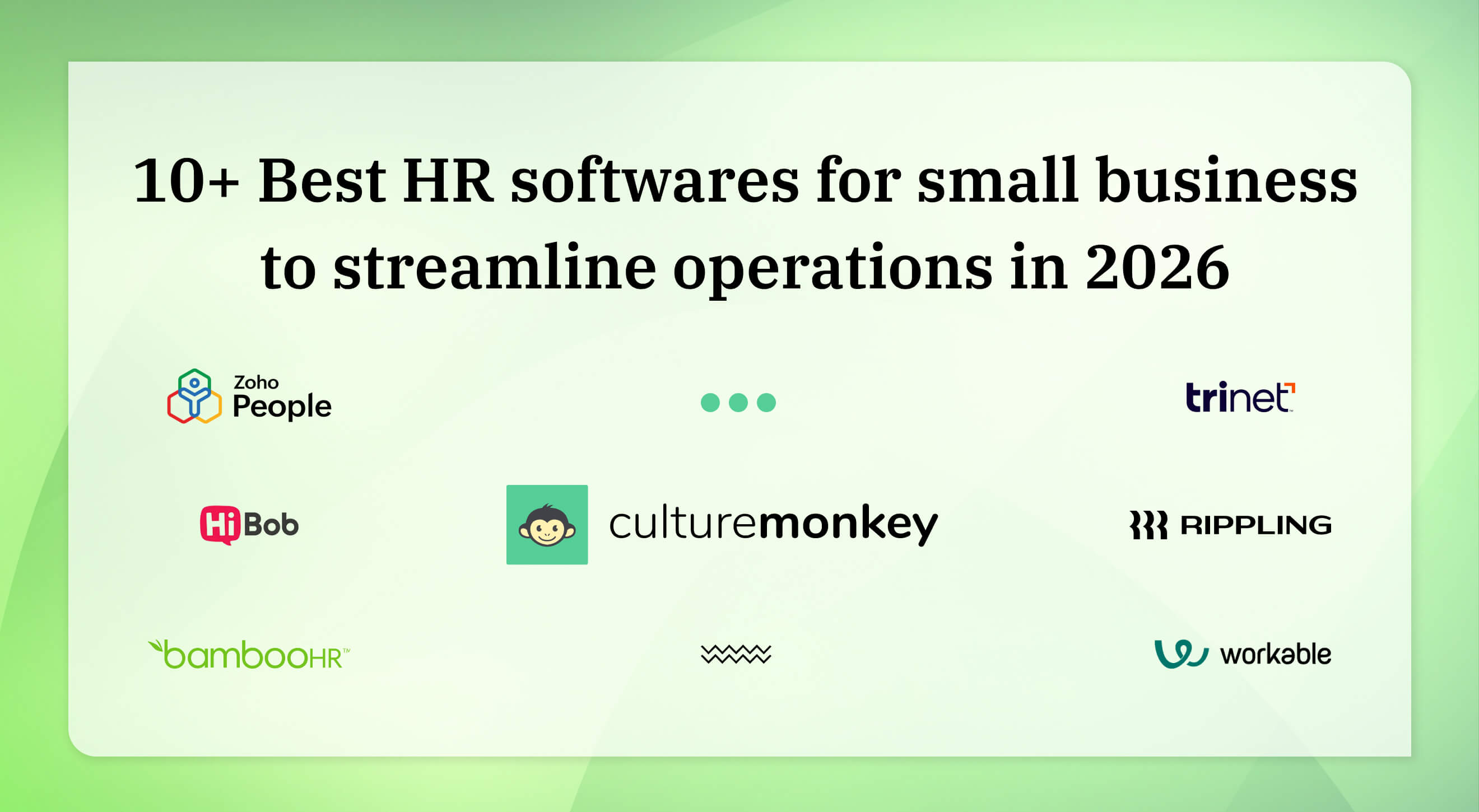10+ Best HR softwares for small business to streamline operations in 2026

Every great road trip has that one person with the snack bag, the playlist, and the perfect ETA. Without them? Chaos. You miss turns, someone forgets the directions, and somehow, you’re 200 miles off course arguing over gas station sandwiches.
That person is to road trips what a good HR system is to small businesses. The behind-the-scenes hero that keeps everyone fed, focused, and moving in the right direction—without the drama or U-turns.
But here’s the thing: most small businesses don’t realize they need one until things start slipping. Payroll confusion, forgotten onboarding steps, scattered records—it adds up fast.
So if your team’s been winging it so far, maybe it’s time to find your HR road trip captain. In this blog, we’ve handpicked the 10 best HR software options tailored for small businesses—tools that can help you streamline operations, boost productivity, and yes, keep the snacks coming.
What is HR software, and what does it do?
HR software is a digital solution that helps businesses manage, automate, and streamline human resource tasks with various HR management features like hiring, onboarding, payroll processing, attendance, and employee data—all in one place. Instead of juggling spreadsheets, sticky notes, and memory, HR software keeps everything organized, accessible, and compliant with labor laws and internal policies.
At its core, HR software for small businesses acts as a digital backbone for managing the entire employee lifecycle. From posting job openings and tracking applicants to sending out offer letters and onboarding new hires, it simplifies every stage. Need to process time-off requests, track attendance, or manage performance reviews? HR software can do that too.
Most platforms also include compliance management reminders, e-signature features, and centralized employee records, so you're not digging through emails when an audit rolls around. It’s like hiring an extra team member, minus the payroll expense. These features are especially valuable at various stages of the organizational life cycle, helping businesses maintain structure and compliance as they grow and evolve.
Why do small businesses need HR software?

When HR tasks pile up, they slow down the very people trying to grow the business. That’s why having the right HR software for small businesses isn’t just helpful—it’s essential.
- Time-saving automation: In a small team, no one has the bandwidth for repetitive HR tasks like manually processing leave requests or chasing signatures. HR management software for small businesses automates these admin jobs so leaders can focus on more strategic work like growth, hiring, or culture-building.
- Compliance without the chaos: Even small companies must follow labor laws, tax regulations, and documentation rules. An HRMS for small businesses helps you stay compliant by automating updates, storing legal templates, and sending reminders, so you avoid mistakes that could lead to legal trouble or fines.
- Smoother onboarding and hiring: Without a structured process, onboarding can feel rushed and disorganized. HR software offers customizable workflows that ensure every step, from documentation to training, is completed properly. This helps new hires settle in faster and leaves a strong first impression.
- Centralized employee information: Employee data scattered across spreadsheets and inboxes leads to confusion. A good HR system for a small company keeps everything—performance notes, contracts, leave records—in one place, making updates and access effortless.
- Stronger internal communication: Important updates often get buried in Slack threads or missed emails. HR software gives you a platform to share announcements, policies, and feedback clearly. For remote or hybrid teams, this brings consistency and keeps everyone on the same page.
8 Must-have features to look for in HR software (Built for small teams)

When you're a small team, every feature in your HR software should work hard—no fluff, no overload. The best HR software for small businesses strikes a balance between simplicity and functionality. Here’s what to look for before clicking “subscribe.”
- Easy employee onboarding: Your HR software should offer digital offer letters, e-signatures, welcome checklists, and document storage. A smooth onboarding process saves time and sets the tone for the employee experience, without needing a separate HR hire to manage it.
- Time-off and attendance tracking: Manually updating leave balances or chasing people about vacation approvals? No thanks! A smart HR system for the small company makes it easy for employees to apply for time off, and for managers to approve it with just a click, with everything recorded automatically.
- Centralized employee database: You shouldn’t have to dig through old emails to find emergency contact info. The software should offer a secure, searchable place to store and manage all employee data, accessible only to those who need it.
- Built-in payroll or integration options: Whether payroll is included or connected via integration, the flow of data—from hours worked to deductions—should be seamless. Many HR software programs for small companies come with payroll add-ons or integrations to make life easier.
- Compliance support: Look for software that helps you stay on the right side of local labor laws. This could include automated alerts, updated legal templates, and digital audit trails—features that protect you as your team grows.
- Self-service portal for employees: Give employees control over their own basic HR tasks—updating personal info, downloading payslips, or checking time-off balances. This reduces admin work and empowers the team.
- Performance management tools: Built-in performance review cycles, goal tracking, and feedback options help small teams stay aligned and focused. Having these features baked into your human resources management software for small businesses encourages a culture of growth, not just tracking.
- Scalable and affordable pricing: You shouldn’t pay enterprise rates for a five-person team. The best HRMS for small business platforms offer flexible pricing, free trials, and modular plans so you only pay for what you actually use, without hidden fees.
Different types of HR software

Not all HR software is built the same. Depending on your business size and goals, you might need a system that handles everything, or just a few core functions.
Here’s a breakdown of the main types of HR software for small businesses to help you choose wisely among various HR software companies.
1. Core HR (HRIS - Human Resource Information System)
This is your foundational HR software. It handles employee records, organizational charts, compliance documentation, and basic workflows like time-off tracking. Ideal for small teams wanting structure without too many bells and whistles.
2. Payroll software
Payroll software focused purely on compensation, payroll systems manager salaries, tax deductions, payslips, and direct deposits. Some HR software for small companies includes built-in payroll, while others offer third-party integrations to ensure your people are paid accurately and on time.
3. Applicant Tracking Systems (ATS)
If hiring is a big priority, an ATS helps you post jobs, manage applications, schedule interviews, and track candidates. Additionally, an ATS helps you streamline recruitment and keeps resumes from getting lost in inboxes.
4. Performance management software
These systems focus on goal-setting, feedback, and performance reviews. They're especially useful for teams aiming to track growth and accountability. Some HRMs for small business platforms include light performance modules too.
5. All-in-one HR suites
These combine multiple HR functions—onboarding, payroll, compliance, performance, and more—into a single platform. Great for small businesses that want everything in one place, without juggling tools or vendors.
What are the warning signs that you need HR software?

Running a small business without HR software can feel fine—until it doesn’t. When cracks start to show in your workflows or your people processes, it’s probably time for an upgrade. Here are the warning signs that your business is outgrowing manual HR methods.
- HR tasks are eating up your whole day: If you’re spending more time tracking leave, answering payroll questions, or digging through employee files than actually managing your team, it’s a red flag. A good HR software for small businesses can reclaim those lost hours.
- Employee records are scattered everywhere: Folders on your laptop, some docs on Google Drive, and others in your inbox. When employee data isn’t centralized, mistakes and delays are inevitable. HR management software for small businesses keeps everything in one secure place.
- Missing important deadlines: Whether it’s benefits enrollment, compliance filings, or review cycles, missing key dates can cost you. HRMS for small business platforms sends automated reminders so nothing slips through the cracks.
- New hire onboarding is clunky or inconsistent: If onboarding varies depending on who’s handling it, that inconsistency can confuse or even frustrate new hires. HR software provides repeatable workflows that ensure a smooth welcome every time.
- Team has no visibility into their own data: Are employees constantly asking about their leave balance, last payslip, or tax forms? That’s a sign you need an hr system for a small company with self-service features that empower employees without overloading you.
- Losing track of performance reviews: Performance conversations are either rushed, forgotten, or stored in random docs. HR software helps you schedule, conduct, and track performance evaluations systematically, so development doesn’t get sidelined.
- Gowing—and feeling the strain: What worked for a 5-person team now feels chaotic with 15. If scaling your processes feels like juggling knives, it’s a sure sign you need scalable HR software for small companies that grow with you.
Benefits of HR software for small businesses

When you’re managing a small team, every hour counts. HR software takes the load off by organizing, automating, and improving your processes. Here’s how HR software for small businesses can make a real difference for you.
Consistent processes, even with a small team
As a small business, you may have limited HR resources, but consistency is key. HR management software for small businesses standardizes processes like onboarding, benefits enrollment, and performance reviews. It ensures each employee gets the same positive experience, even if the team grows or changes, so there’s no guesswork and fewer mistakes.
Better data security and accuracy
Handling employee records on paper or in spreadsheets opens the door to costly errors or, worse, security risks. HRMS for small business platforms centralizes and encrypted sensitive data, enhancing data management. , ensuring it’s secure and easily accessible. With automatic data updates, you can eliminate human error and make sure your records are always accurate and up-to-date.
Faster decision-making with real-time data
Time is money, especially when you’re trying to grow a business. With payroll solutions integrated, HR software for small businesses provides real-time data and insights. at your fingertips. This allows you to quickly analyze trends in hiring, retention, or performance, which speeds up decision-making and helps you stay on top of your business needs.
Boosts employee experience and trust
Employees value transparency and efficiency. With HR software for small companies, your team can access their own information through an employee self-service portal. , like payslips, leave balances, or benefits options. This self-service feature empowers employees and builds trust in your company, while reducing the time HR spends on answering routine questions.
Enables lean HR teams to do more
In a small business, HR resources are usually limited. HRMS for small business software allows your lean HR team (or even one person) to handle more tasks effectively. Automated workflows, data tracking, and easy access to records free up time for more strategic initiatives, like employee engagement or growth planning.
Simplifies remote and hybrid work setups
Whether your team is remote, hybrid, or in-office, HR software streamlines the way you manage a distributed workforce. Centralized communication, document sharing, and task management tools ensure everyone is aligned, no matter where they’re working. This keeps your company connected and ensures remote workers feel equally supported.
Tracks growth and performance over time
As your business expands, tracking your team’s progress becomes more complex. HR software for small businesses provides performance tracking tools that enhance talent management. that allow you to measure productivity, goals, and growth over time. These analytics help you identify trends, assess individual or team progress, and adjust your strategies as needed to foster continuous improvement.
Easier scalability as your team grows
What works for a team of five might not work for a team of 50. Fortunately, HR management software for small businesses is designed to scale with your business. Whether you need additional features, more users, or deeper integrations, the software can adapt to your growing needs, saving you the hassle of switching platforms as you expand.
How HR tech can help build culture, not just systems?

HR technology is often seen as a tool for streamlining administrative tasks, but it can do so much more. When used strategically, it can help foster a strong, vibrant company culture that resonates with employees.
Here are some ways HR tech can shape your business culture and take it to the next level.
- Enhances communication and transparency: HR tech fosters open communication by creating a platform where employees can easily access company updates, team announcements, and important information. This transparency builds trust and helps employees feel more connected to the company’s goals and values.
- Encourages employee feedback and recognition: With HR software, gathering regular feedback becomes seamless. Whether it’s through surveys or pulse checks, employees feel their voices are heard. Additionally, tech solutions can include features for peer-to-peer recognition, allowing employees to celebrate each other’s achievements, reinforcing a culture of appreciation.
- Aligns employees with company values: HR tech can integrate company values directly into day-to-day processes. From onboarding to performance reviews, technology helps ensure that employees understand and align with company values, making these values a natural part of their work experience rather than just abstract concepts.
- Supports learning and development: HR tech makes it easier to manage learning and development programs. It allows employees to access training materials, development resources, and career growth opportunities. This continuous focus on development cultivates a growth mindset, boosting engagement and long-term commitment to the organization.
- Fosters inclusion and diversity: HR technology can help create a more inclusive workplace by tracking diversity metrics, ensuring fair hiring practices, and providing tools that promote equal opportunities. Inclusive cultures lead to better employee satisfaction and retention, enhancing overall team performance.
- Strengthens employee engagement: By offering employees easy access to recognition, rewards, and career development tools, HR tech enhances engagement. Employees who feel supported by the technology are more likely to invest in their work, contributing to a positive, motivated atmosphere within the company.
- Facilitates work-life balance: HR tech supports employees in achieving a healthy work-life balance through self-service features, flexible scheduling tools, and easier management of time off. By prioritizing employee well-being, you create a company culture that values personal time as much as productivity, leading to a more satisfied and loyal workforce.
Comparison chart of top HR software

Choosing the right HR software can be a game-changer for small businesses looking to streamline operations and enhance employee management. With so many options available, it’s important to know which features matter most to your company. Here's a quick comparison chart of the top HR software for small businesses to help you make an informed decision.
| HR Software | Key Features | Best For | Pricing |
|---|---|---|---|
| CultureMonkey | Employee engagement surveys, feedback analysis, pulse surveys, and real-time reporting | Small to enterprise-sized businesses focusing on workplace culture and employee engagement | Custom pricing |
| factoHR | Payroll, attendance, onboarding, performance, employee self-service, mobile access, reports | Businesses looking for an all-in-one HR automation platform | Custom pricing |
| BambooHR | Employee records, time-off tracking, performance management, payroll integration | Small to medium-sized businesses | Custom pricing |
| Gusto | Payroll, benefits management, compliance, tax filing, hiring tools | Payroll and benefits administration | Starts at $49/month |
| Paycor | Payroll, time tracking, benefits, performance management, and employee scheduling | Small businesses with complex needs | Custom pricing |
| Rippling | Payroll, benefits, employee devices, IT management, global compliance | Businesses with international teams | Custom pricing |
| Zoho People | Time-off management, performance reviews, employee database, and recruitment | Small businesses with recruitment needs | Starts at $1/employee/month |
| Deel | Global payroll, contract management, international compliance, and contractor management | International and remote teams | Custom pricing |
| Hibob | Employee engagement, performance reviews, HR reporting, payroll integration | Growing businesses with remote teams | Custom pricing |
| Trinet | Payroll, benefits, compliance support, risk management, HR consulting | Small businesses needing full HR support | Custom pricing |
| Workable | Job postings, applicant tracking, candidate management, and interview scheduling | Companies hiring new talent | Custom pricing |
| HubSpot CRM | Centralizing candidate data and employee records, candidate pipeline management, engagement tracking | Growing businesses hiring new talent | Free Paid plans start at $9/user/month |
10+ Best HR software for small businesses

Choosing the right HR software can transform how your small business manages employees, boosts engagement, and stays compliant. From payroll management to performance tracking, these platforms offer a range of features that help small businesses streamline their HR processes. Here are the top 10 HR software for small businesses that can boost efficiency and company culture.
1. CultureMonkey
CultureMonkey is a robust employee engagement survey software tailored for small businesses aiming to build a people-first culture with limited HR resources. Its intuitive platform automates employee feedback collection and provides actionable insights to help small teams boost engagement, retention, and performance, without the complexity of enterprise systems.
- Automated pulse and lifecycle surveys: Run recurring surveys effortlessly to track employee sentiment across different stages of the employee journey.
- 65+ ready-to-use survey templates: Choose from a wide range of research-backed templates to quickly launch engagement, eNPS, DEI, and onboarding surveys.
- Anonymous feedback and AI insights: Ensure honest responses and uncover patterns through sentiment and thematic analysis powered by AI.
- Multi-channel survey distribution: Reach employees on their preferred platforms—email, Slack, WhatsApp, MS Teams, and SMS—for higher response rates.
- Multilingual survey support: Engage a diverse workforce with surveys available in 100+ languages for better inclusivity and accurate feedback.
- Manager-specific dashboards and action planning: Empower managers with personalized insights and recommendations to drive team-level improvements.
- Scalable for growing teams: Built to support small businesses now and scale with them as they grow, without overwhelming resources or workflows.
2. factoHR
factoHR is a smart and easy-to-use HR software that helps businesses manage everything from payroll and attendance to performance, onboarding, and more all in one place.
Whether you're a growing startup or a well-established company, factoHR makes it simple to handle everyday HR tasks without the usual hassle. With features like employee self-service, mobile access, automated workflows, and insightful reports, it takes the load off your HR team and gives them more time to focus on what really matters, supporting your people, improving productivity, and helping your business grow with confidence.
3. BambooHR
BambooHR is a user-friendly HR software that offers essential features like employee records management, performance tracking, and time-off requests. It’s designed for small to medium-sized businesses and helps streamline HR workflows, making it easier to scale operations as your team grows.
4. Gusto
Gusto is a popular HR software for small businesses that integrates payroll, benefits administration, and employee management. It’s known for its simplicity and ease of use, especially for companies new to HR tech. With automated payroll and tax filings, Gusto saves small businesses time and ensures compliance.
5. Paycor
Paycor offers a cloud-based HR software that includes tools for payroll, benefits, and time tracking. Its flexible reporting capabilities make it a great choice for businesses that need custom insights. Paycor also integrates with accounting software, ensuring that your HR and financial processes are seamlessly connected.
6. Rippling
Rippling combines HR and IT management, making it a standout for small businesses that need to manage both aspects efficiently. It automates payroll, benefits, and compliance tasks, while also handling employee devices and software access. Rippling’s all-in-one approach saves time and simplifies HR and IT administration.
7. Zoho People
Zoho People offers a robust HR management solution with features like performance management, time tracking, and recruitment. It integrates well with other Zoho products, providing a comprehensive suite for small businesses. Its customizable workflows allow you to tailor HR processes to your business’s needs.
8. Deel
Deel specializes in managing international teams, making it perfect for businesses with a global workforce. It simplifies contract management, payroll, and compliance across different countries. Deel supports both full-time employees and contractors, streamlining global HR operations for small businesses.
9. Hibob
Hibob offers an intuitive platform that focuses on employee engagement, payroll, and HR administration. It’s designed for small businesses that want a modern, easy-to-use solution for managing their teams. Hibob’s clean interface and integration capabilities make it a great option for growing companies.
10. Trinet
Trinet provides comprehensive HR solutions that include payroll, benefits, risk mitigation, and compliance support. It’s tailored to small businesses and startups, offering robust customer service and support. Trinet’s platform helps ensure small businesses are compliant with regulations while focusing on employee satisfaction.
11. Workable
Workable specializes in recruitment and the hiring process through applicant tracking, making it an excellent choice for small businesses looking to hire. It streamlines job postings, candidate screenings, and interview scheduling. With its powerful hiring tools, Workable helps small businesses find the right talent quickly and efficiently.
12. HubSpot CRM
HubSpot’s CRM, coupled with its free HR specific tools, is a great option for organizing candidate and employee records, as well as managing hiring processes.
The platform centralizes data from across multiple sources, while its built-in email automation and pipeline management features help handle and nurture new candidates throughout the hiring process.
Plus, the platform’s App Marketplace offers hundreds of integration options, with payroll and recruitment software included.
Choosing the right HR software for your small business

Selecting the right HR software is crucial for streamlining your processes and supporting your team effectively. With so many options available, it’s essential to assess your business needs carefully. Here are six steps to help you make the best decision when choosing HR software for your small business.
1. Identify your HR needs
Start by listing out the specific HR tasks your business needs help with, such as payroll, recruitment, or employee performance tracking. Understanding your current challenges will help you find software that fits your unique needs. Make sure the software you choose addresses your business’s immediate pain points and growth plans.
2. Consider scalability
As your business grows, your HR software should be able to grow with you. Look for a platform that can handle increasing employees and more complex HR functions without needing to switch to a different solution. Scalability ensures you won't outgrow your software too soon and that it adapts to future needs.
3. Evaluate user-friendliness
The best HR software should be easy to navigate for both HR managers and employees. Look for platforms with an intuitive interface and minimal training required. A user-friendly system will save you time, reduce errors, and encourage employee adoption.
4. Check for integration capabilities
Ensure the HR software integrates well with other tools your business uses, like payroll systems, accounting software, or productivity tools. Integration reduces the need for manual data entry and helps maintain accurate, up-to-date records across all platforms.
5. Review customer support options
Strong customer support can make a big difference when using HR software, especially for small businesses. Look for providers offering 24/7 support, whether through chat, email, or phone, and consider customer reviews to gauge how responsive and helpful they are.
6. Set a budget
Finally, set a realistic budget based on the features you need and your business size. Consider both upfront costs and long-term fees like subscription charges or additional feature costs. The best HR software balances affordability with the functionality your business needs.
Common mistakes to avoid when choosing HR software

Choosing the right HR software is crucial for small businesses, but it’s easy to make mistakes along the way. These mistakes can result in wasted time, money, and resources. Here are the common pitfalls to avoid when selecting HR software for your business.
Not identifying specific needs
Many businesses fail to clearly identify their specific HR services, leading them to choose software that doesn’t address their unique challenges. Before you start, take the time to list the features you need—whether it's payroll, recruitment, or performance management. This will help you avoid wasting resources on a solution that doesn’t meet your core needs.
Overlooking scalability
Choosing software that fits your current size is important, but don’t forget about future growth. Many businesses pick HR software that can’t scale as they grow, forcing them to switch platforms later. Always look for a solution that can grow with your business to handle increased employees or more complex HR needs.
Ignoring ease of use
Software that is difficult to navigate can quickly lead to employee frustration and errors. If your HR software requires complex training, it can become a burden rather than a help. Choose software that’s easy to use for both HR professionals and employees, ensuring smooth implementation process and adoption across your team.
Focusing solely on price
While budget is a key consideration, it’s a mistake to focus solely on price when choosing HR software. A lower-priced option might save money initially, but it may lack the essential features that your business needs to succeed. Assess the software’s value by considering the features, scalability, and long-term benefits it provides.
Forgetting about integration capabilities
Without proper integration, you’ll end up with disconnected systems, leading to duplication of effort and potential data errors. Ensure the HR software you choose integrates seamlessly with your existing tools, such as payroll operations, accounting, or project management platforms. This will help streamline your processes and keep everything in sync.
Not checking for customer support
Good customer support is vital when implementing HR software, especially for small businesses with limited resources. When selecting a platform, make sure the vendor provides easy access to support, whether it’s through chat, phone, or email. This will ensure you have help when issues arise, preventing downtime and frustration.
Overcomplicating the selection process
Choosing HR software can feel overwhelming with so many options available, but it’s important not to overcomplicate the decision. Focus on the core functionalities your business needs, and avoid getting bogged down by unnecessary features. Keep your selection process simple to ensure you choose the right fit without confusion.
How to successfully implement HR software in a small business?

Implementing HR software can significantly streamline HR tasks in small businesses, but it’s important to approach it methodically. Proper planning, clear communication, and ongoing support are key to a successful launch. Here are the steps you should follow for a smooth and efficient implementation.
- Plan your implementation strategy: Before diving in, create a detailed implementation plan. Outline clear goals, responsibilities, and timelines. A structured strategy ensures the entire team knows what to expect, making the transition to the new system smoother.
- Involve your HR team early on: Your HR team will be the primary users, so getting their input early is crucial. Discuss what they need from the software and ensure it meets their day-to-day requirements. Their involvement will help ensure the system is user-friendly and effective for your business.
- Provide proper training for your team: Effective training is vital to help your team use the software correctly. Offer initial and ongoing training sessions to help employees master the system. This will minimize mistakes and ensure everyone is confident in using the new software.
- Test the software before going live: Testing the software is essential to identify potential problems before launch. Run through key processes like payroll and performance tracking to check for bugs. A test run will ensure that the software works smoothly and is ready for full deployment.
- Communicate changes to the entire company: When implementing new software, clear communication is crucial. Explain the purpose of the new system, how it will affect employees, and any required actions. Keeping everyone informed will help reduce uncertainty and increase employee acceptance of the changes.
- Monitor progress and gather feedback: After implementation, continuously monitor the software’s performance. Collect feedback from HR staff and employees to identify any areas that need adjustment. Regular feedback ensures that the system is working as intended and helps fine-tune the software for better efficiency.
- Stay on top of updates and maintenance: HR software often requires updates for new features and bug fixes. Stay on top of these updates to maintain system efficiency and security. Regular maintenance ensures the software continues to meet your business needs and operates without issues over time.
How to evaluate HR software for value for money?

Evaluating HR software for value for money is crucial, especially for small businesses with tight budgets. It's not just about the initial cost but the long-term benefits the software offers.
Here’s how to assess HR software to make sure you're getting the most bang for your buck.
- Assess the features versus cost: Start by comparing the features of the software with its price tag. Ensure that the software includes the tools necessary for your HR needs, such as payroll, recruitment, and performance management. While a lower price might seem appealing, ensure you’re not sacrificing essential features for cost savings.
- Consider scalability: Look for HR software that can grow with your business. Scalability is important because, as your business expands, you’ll need more advanced features and capabilities. Make sure the software offers tiered pricing or additional features that can accommodate your growing needs without requiring a full switch to a new platform.
- Evaluate ease of use and implementation: The easier the software is to use and implement, the less time and money you’ll spend on training and onboarding. Evaluate whether the software is intuitive enough for your team to adopt quickly, which can save you on additional training costs and reduce the time it takes to get up and running.
- Look for hidden fees: Some HR software providers may offer a low initial cost but tack on hidden fees for things like additional users, integrations, or premium features. Carefully review the pricing structure to identify any potential hidden costs that could impact your budget in the long run.
- Consider customer support and service: Good customer support can save you a lot of time and hassle. Look for a provider that offers comprehensive support, including training, troubleshooting, and ongoing assistance. Quality support ensures that issues are resolved quickly and minimizes disruptions to your business.
- Read reviews and feedback: Do your research by reading reviews from other small business owners and HR professionals. Feedback from actual users can provide insights into the software’s reliability, functionality, and ease of use. Pay attention to recurring complaints or issues to help you make a more informed decision.
- Factor in long-term ROI: Finally, consider the long-term return on investment (ROI). HR software that saves time, reduces errors, and streamlines processes can lead to significant savings in the long run. Look beyond the upfront cost and evaluate how much time and money the software will save your business over time.
Conclusion
Streamlining HR operations isn’t just a nice-to-have for small businesses—it’s a necessity. The right HR software can automate time-consuming tasks, improve compliance, and free up resources so your team can focus on what truly matters: people. Whether you need tools for payroll, attendance, onboarding, or employee engagement, this list of HR software solutions offers something for every kind of small business.
Platforms like CultureMonkey stand out by offering powerful employee feedback tools, including pulse surveys, anonymous feedback, multilingual support, and AI-driven analytics—all tailored to help small businesses foster a healthy workplace culture.
As you scale, choosing flexible and intuitive software can reduce growing pains and empower smarter decision-making. The key is to prioritize platforms that combine ease of use with deep functionality. When you invest in the right HR tech stack early on, you set the foundation for a productive, engaged, and compliant workforce in the long run.
FAQs
1. What is the best HR software for a small company?
The best HR software for a small company depends on your business needs, budget, and growth plans. Popular options like CultureMonkey, BambooHR, and Gusto offer user-friendly interfaces, essential HR features, and scalability. When choosing the right HR software, consider factors like payroll integration, employee engagement tools, and ease of use to ensure it fits your company's requirements and budget.
2. Can I get reliable HR tools on a small budget?
Yes, reliable HR tools are available for small businesses on a budget. Many software options, like Zoho People and Gusto, offer affordable pricing tiers with core HR features. By evaluating the software's essential capabilities, you can find a solution that fits your budget while streamlining HR processes and ensuring efficiency without compromising quality.
3. How Long does it take to implement HR software?
Implementing HR software typically takes 2 to 4 weeks, depending on your business size and the software's complexity. This timeline includes setup, data migration, training, and system testing. A clear implementation plan, employee training, and testing before going live can ensure a smooth transition, avoiding potential delays and ensuring the system is fully functional from day one.
4. Do I need separate software for payroll and HR?
It’s not always necessary to have separate software for payroll and HR. Many HR platforms, like CultureMonkey, integrate payroll management with other HR functions such as time tracking, benefits administration, and performance reviews. Choosing an all-in-one solution can save time and money while offering a seamless experience for both HR teams and employees.
5. Is HR software worth it for companies with fewer than 50 employees?
Yes, HR software is worth it for companies with fewer than 50 employees. It helps streamline administrative tasks, improves compliance, and enhances employee engagement. Even small businesses benefit from HR software’s automation, saving time and reducing human error. Tools like CultureMonkey and BambooHR are specifically designed for small businesses, making them affordable and effective solutions.










